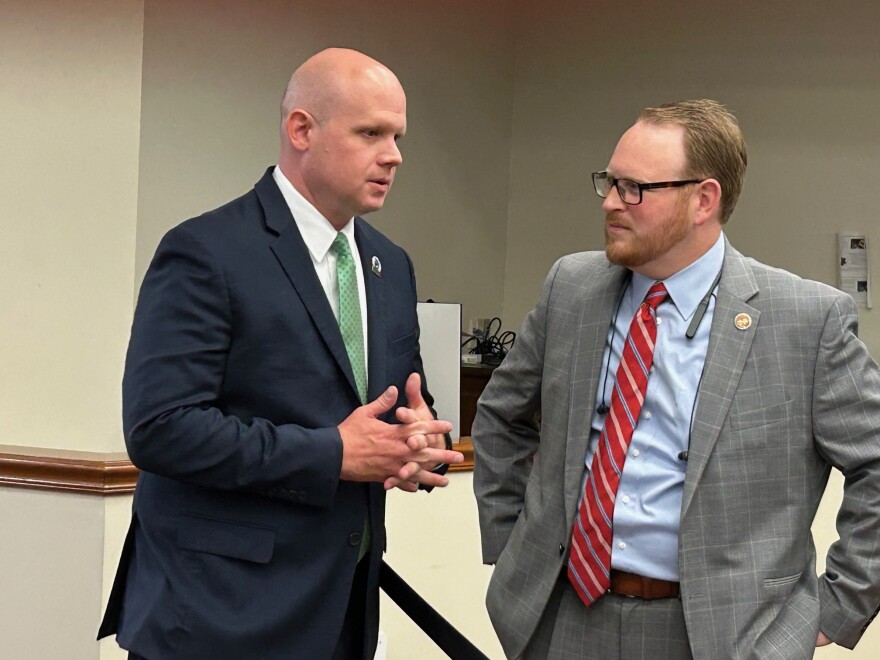SCDOT WORKING TO ALLEVIATE TRAFFIC CONGESTION AND BOTTLENECKS
South Carolina’s dramatic growth is presenting unprecedented challenges to state and local governments. And none are greater than those facing the S.C. Department of Transportation.
Not only is South Carolina one of the fastest growing states in the country, it has one of the largest highway systems – 71,000 miles of roads, and 8,400 bridges that must be maintained.
On August 20th a special committee of the state House of Representatives met in Columbia and began focusing on modernizing SCDOT in an effort to better position the agency for the future.
Earlier this summer when House Speaker Murrell Smith, R-Sumter, created the Department of Transportation Modernization Ad Hoc Committee, he reminded its members that the current road system was built with two and a half to three million residents in mind.
“We are approaching six million people now. So, our roads that were created 30 and 40 years ago are not going to serve us for what we are doing right now,” Smith said.

In 2017, the S.C. General Assembly voted to increase the gas tax by 12 cents to just under 29 cents a gallon.
State DOT Secretary Justin Powell says that increase was “a repair bill” aimed at fixing the state’s crumbling road system.
Since then, according to DOT, the tax increase has generated over $5 billion for repaving, interstate widening and bridge repair and bridge replacement. Together with federal funds, and millions of dollars in one-time money from the Legislature, Powell said some $7 billion of road work has been completed or is underway.
“We’ve got to continue with the recovery and the repair of our state highway system, but we’ve also got to be able to deal with the growth,” Powell said in a recent interview with S.C. Public Radio.
“Our network has to keep up with the demands being placed on it,” he added.
Powell attributes the dramatic increase in volume on state roads and highways to several things. Population growth, record industrial growth, and the booming Port of Charleston which is responsible for a growing increase in container truck traffic.
“We are definitely seeing pressures of growth and congestion. I didn’t think we would see some of those challenges that you would see in an Atlanta or Charlotte that are now showing up in Greenville, and Charleston, and Myrtle Beach and across South Carolina,” he said.
Powell says that research in 2017 when the General Assembly enacted Act 40 (the roads bill) showed the main concern on drivers’ minds then was the “poor condition” of state roads. Current research he says finds that has been replaced with “congestion and bottlenecks.”
According to SCDOT road improvement projects are underway in every county in the state.
Hundreds of millions of dollars are being spent to widen Interstates 26 and 95.
The price tag for the “Carolina Crossroads” project in the Midlands is just over $2 billion. That project, known locally as “Malfunction Junction,” will improve 14 miles of the busy I-20/I-26/I-126 corridor in Columbia.
Planning is underway for the largest and most expensive state road project ever, the planned rebuilding of the I-526 corridor in Charleston. It’s estimated to cost $7 billion.
The newly created legislative committee plans to look at ways SCDOT might generate additional revenue going forward without another increase to the gas tax. Lawmakers have made it clear that it’s too soon to consider another increase.
Ideas to be considered include increasing fees for electric and hybrid vehicles, toll roads, and utilizing SCDOT’s borrowing authority for what Powell calls “generational” projects like the planned I-526 corridor.
“We’re going to have to be talking about money,” Powell said in the recent interview. “We’re going to have to be creative about how we can make that project (I-526) happen, while all at the same time still addressing all of the same needs that we have across South Carolina,” he added.
When it comes to considering potential legislative recommendations for increased funding, committee co-chair Rep. Heather Ammons Crawford, R-Horry, said recently, “everything is on the table.”



